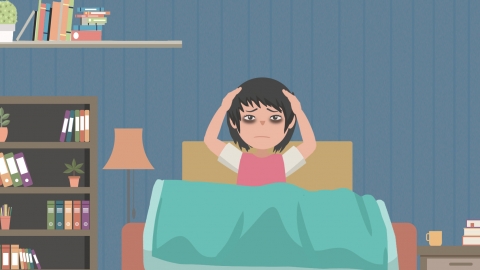What causes dizziness and sleepiness in the morning?
Generally, morning dizziness and sleepiness may be caused by insufficient sleep, excessive fatigue, rising too quickly, iron-deficiency anemia, cervical spondylosis, and other factors. Symptomatic management such as general treatment and medication may be needed. If discomfort persists, it is recommended to seek medical advice promptly and undergo appropriate treatment under a doctor's guidance. Detailed explanations are as follows:

1. Insufficient Sleep
Long-term late nights, poor sleep quality, or inadequate sleep duration can prevent the brain and body from obtaining sufficient rest, resulting in symptoms of dizziness and sleepiness upon waking in the morning. These symptoms may be accompanied by listlessness, difficulty concentrating, and memory decline. It is recommended to improve the sleep environment, maintain a regular sleep schedule, avoid using electronic devices before bedtime, and improve sleep quality.
2. Excessive Fatigue
Recent high stress levels or physical overexertion can reduce bodily functions, preventing the brain from obtaining adequate rest and recovery, thereby causing dizziness and fatigue. These may be accompanied by physical weakness, muscle soreness, and low spirits. It is important to rest adequately in daily life, arrange work and rest time reasonably, and avoid excessive fatigue.
3. Rising Too Quickly
When the body transitions from lying down to standing, blood needs to be rapidly redistributed to adapt to gravitational changes. If this process occurs too quickly, the heart may be unable to immediately supply sufficient blood to the brain, causing transient hypotension and dizziness. Symptoms may include visual darkening and unsteadiness upon standing. It is recommended to move slowly when getting up, sit up first, pause briefly, and then stand, which can help reduce episodes of dizziness.
4. Iron-Deficiency Anemia
Iron-deficiency anemia is caused by a lack of iron in the body. This condition significantly reduces serum iron levels, affecting blood and oxygen supply to the brain, which can lead to symptoms such as dizziness and fatigue. These symptoms may be accompanied by pale skin and mucous membranes, listlessness, weakness, and palpitations. It is recommended to take iron supplements such as polysaccharide iron complex capsules, ferrous sulfate tablets, or iron dextran dispersible tablets under a doctor's guidance to improve anemia symptoms.
5. Cervical Spondylosis
Long-term cervical strain or degeneration may lead to cervical spondylosis, which can compress neck blood vessels and affect cerebral blood flow, especially the vertebral artery. Insufficient blood supply can cause symptoms such as dizziness and blurred vision, and may also be accompanied by neck stiffness, shoulder and back pain, and arm numbness. It is recommended to follow medical advice and use medications such as chlorzoxazone tablets, eperisone hydrochloride tablets, or naproxen sodium tablets to relieve symptoms.
It is also recommended to perform simple stretching exercises after waking up, such as neck rotation and yawning stretches, to promote blood circulation and alleviate discomfort.




